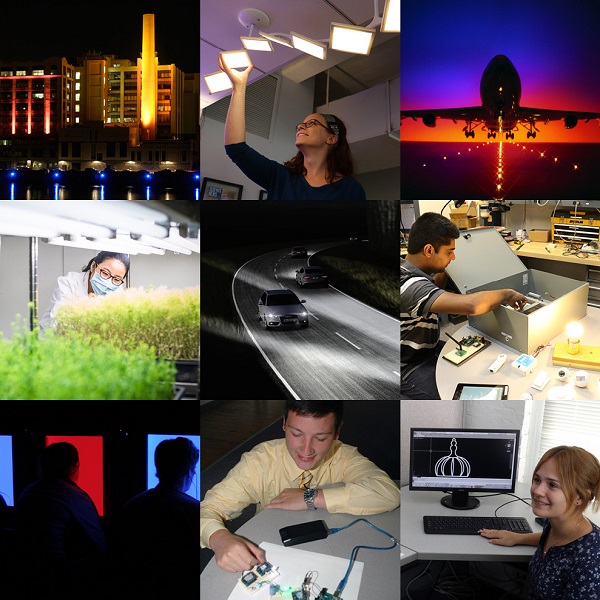The Lighting Research Center (LRC) at Rensselaer Polytechnic Institute has recently expanded its M.S. in Lighting degree program to include a paid career externship at a leading lighting manufacturer, design firm, or government organization. Upon graduation, students now have the opportunity to participate in a paid externship for three months or more with one of many lighting organizations that have agreed to host LRC students, including Current by GE, OSRAM, Philips Lighting, the New York State Energy Research and Development Authority, Bridgelux, Hubbell Lighting, Ketra, USAI Lighting, and numerous others.
“The new externship program is an excellent opportunity for students to gain additional real-world career experience in lighting, outside of the classroom and laboratory,” said Rensselaer Professor Nadarajah Narendran, Ph.D., the LRC’s director of research. “It is a bridge to a career in lighting.”
 |
|
The Lighting Research Center (LRC) at Rensselaer Polytechnic Institute various research projects. (Renesselaer Polytechnic Institute/LEDinside) |
In 1990, the LRC became the first university research center to offer graduate degrees in lighting and today, offers a M.S. in lighting and a Ph.D. to educate future leaders in lighting. The LRC is part of Rensselaer Polytechnic Institute, America’s first technological research university, founded in 1824. With more than 35 faculty and staff working closely with 15 select graduate students, and a 30,000 sq. ft. laboratory space, the LRC is the largest university-based lighting research and education organization in the world.
The M.S. in Lighting program at Rensselaer is the premier master's level graduate degree offered in the field of lighting, focusing on lighting technology, design, human factors, and applications. This 9-month degree program allows students to engage with world-class faculty experts in architecture, engineering, design, and biosciences. Students enrolled in the LRC’s M.S. in Lighting program explore emerging trends in customization and data analytics, in areas such as the Internet of Things (IoT) and networked/connected lighting, 3D printing of lighting components, lighting for circadian health and wellbeing, lighting for plant health, aviation and automotive lighting, and other topics in lighting technology, application and design. The LRC attracts students with undergraduate degrees in engineering, physics, biology, psychology, architecture, and design.
The program culminates in a master’s project in the second semester during which each student focuses on a particular area of interest under the guidance of a faculty advisor. Some examples of recent student projects include: remote monitoring of LED lighting system performance, designing a portfolio of lighting patterns to support circadian health and wellbeing, studying the impact of lighting on performance, and evaluating OLED and edge-lit LED lighting panels.
The application deadline for Fall 2017 is January 2, 2017. For more information, visit: http://www.lrc.rpi.edu/education/graduateEducation/degrees/msintroduction.asp





 CN
TW
EN
CN
TW
EN





